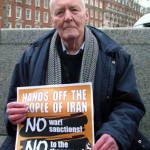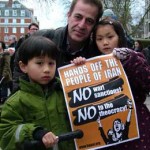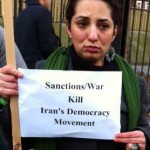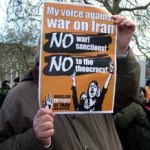On January 28 around 300 protesters gathered at the American embassy to oppose the increasingly bellicose rhetoric against Iran and Syria. Called by the Stop the War Coalition under the title of ‘Stop the war before it starts: don’t attack Iran/Syria’, the protest was in many respects something that seasoned activists in the anti-war movement would be all too familiar with. Well-meaning, if often slightly tedious and repetitive speeches, a few chants and the promise to build an enormous opposition that could finally scupper the imperialists’ plans once and for all. However, it soon became apparent that this was not going to be simply ‘business as usual’. In a somewhat embarrassing indictment to the approach of ‘as broad as possible’ typified by the coalition, several speakers were booed or chanted down, and fights broke out between protesters. At one point a group of Iranians from the London Green movement lined up against supporters of the Syrian Baathist regime under the sway of Bashar Al-Assad. It was not pretty.
The first indications that something was not quite right came when I was handing out Hands Off the People of Iran leaflets (‘Make your voice heard': see here). The leaflets were readily snapped up, but it soon became apparent that several of the people I had handed leaflets too – particularly young men – were sporting baseball caps emblazoned with the Syrian flag (not that of the Syrian opposition) and a picture of Al-Assad in all his despotic glory.
At the same time, about 40 Iranian protesters were gathering behind banners reading ‘Free Iran’. From afar, this demonstration must have seemed like the prelude to some conflict, not a demonstration to oppose one.
When the rather compromised figure of Abbas Eddalat of the Campaign Against Sanctions and Military Intervention in Iran spoke, noise erupted from the ‘Free Iran’ contingent. In the din it was not all clear what he was saying – though he went out of his way to assure the protesters that the theocratic regime in Iran was not interested in building nuclear weapons. It was obvious that the Iranians wanted their voices to be heard in a different fashion, by somebody else.
This angered the Syrians, and soon both groups squared up. They were separated only by police barriers and four or five rather dumbfounded police constables. Some of the younger male Syrians initially managed to get quite close to the Iranians. Wrapped in Syrian flags and with bandanas reading “labeik Khameni – I worship Khamenei” around their heads, they meted out some quite heavy blows to some of the Iranians leading the chants. Adding to the absurdity of the situation, the handful of Iranians waving the Islamic Republic of Iran flags then joined with their Syrian comrades. One woman joined the two together and waved them proudly. The Iranian Khamenei supporters were in a distinct minority – most were young men from Syria. Yet the Iranian Islamists were not coy, with one pushing Hopi chair Yassamine Mather as she was being filmed. This sets a rather distasteful precedent.
Chants of ‘Long live Syria’ were met with ‘Down with Hezbollah’. Some of the chanting being lead from the stage was utterly drowned out. Keen to find out just who some of these people were, comrades working with Hopi managed to speak to some of them, and were informed that it was actually acceptable for women wearing bikinis to be stoned.
There was a fleeting moment of humanity, however, when the clashes temporarily were broken off to remove a small girl from the crowd, who had been hurtled to the floor.
But from this point on things were really out of control. The stewards were quite rightly at a loss, and some of the protesters were calling in the police to break up fights.
Speeches from the platform were constantly interrupted: it seemed that the Syrians wanted to talk about Syria. Indeed, this demonstration was also supposed to be about Syria too. But the organisers were keen to play down the Syrian aspect and none of the platform speakers really discussed Syria at all. This obviously upset the al-Assad fans, leading to them disrupting the demonstration and letting loose on the Iranian oppositionists. They did their best to make it known just how much they loved al-Assad, instigating attempts by rather embarrassed Iranians to stop them .
One of the main organisers of the Syrian contingent could be seen handing out copies of the CPGB-ML’s publication, ‘Proletarian’. I therefore wondered whether some of the hostility towards StWC speakers also stemmed from the latter organisation’s unceremonious ejection from the coalition for their veneration of former Libyan despot, Colonel Gaddafi.
Opportunism is the handmaiden of inconsistency. After all, just a few months ago the leadership of Stop the War booted out these very same people for their fawning praise of Gaddafi, supposed man of the people.
So it was fine (indeed a precondition of membership!) to oppose imperialist intervention in Libya while supporting protesters against their own dictator, but when it comes to Iran … No, no comrades, we cannot allow forces to affiliate to the coalition (like Hopi) who have the temerity to oppose imperialism AND criticise the theocracy. Many platform speakers were absolutely correct to chastise the double standards of the West when lecturing Iran on the perils of nuclear technology. But we also have to look at our own movement’s double standards once in a while.
The organisers did their best to calm the situation. But the arguments of the main speakers Lindsey German, John Rees and Andrew Murray were, as with their arguments against Hopi, largely mendacious.
“You are making the biggest mistake of your lives if on the basis of opposition you support the war”, Lindsey German shouted over the noise.
Quite right. In the past, the Iranian left has, of course, been tainted by the presence of all sorts of useful idiots lining up with the war drive. But the 40 or so Iranians at this demonstration were clearly, visibly anti-war. Most were keen to take a Hopi leaflet, and many carried official Stop the War placards reading ‘Don’t attack Iran’. Some of their supporters held up signs making the obvious point: ‘Sanctions and war kill Iran’s democracy movement’. If there is a criticism that can be made of the ‘London Green movement’, it is that their opposition to the entire regime came far too late. But now is the time to organise. The Iranians present on the demonstration should affiliate to the StWC and fight for basic internationalist principles.
German, Rees et al are actually going to fairly desperate lengths to dodge the issue at hand, ie the fact that they have consistently – both in the SWP and their new setup – opposed the affiliation of anti-imperialists critical of the Iranian regime. Hopi does not to make it a condition of entry that the StWC adopts the same policies as Hopi. We are in Britain and thus – yes – our main duty is to stop the warmongers. But we reject the notion that we must silence ourselves if we want to take part. Given that a section of the Iranian regime are not exactly indifferent to the prospect of war (desperate times, desperate measures!) this matter is hardly a mere trifle.
Indeed, I am also a bit perplexed by the notion that ‘the Iranian regime is a matter for the Iranian people themselves’. On one level this is obvious. Even though the clashes between Hezbollah supporters and Iranian democracy protesters may have made it feel like Tehran, the demo took place in London.
But is not the struggle against war in the Middle East – a powder keg of war and revolution – bound up with the strength and success of radical movements for change from below? Is it so heinous a crime to have platform speakers who have politics beyond ‘let’s all stop the war’? Fresh from a trip to Cairo, John Rees made this very point: the unfolding Egyptian revolution stood as an indictment of the arguments made by liberal and social imperialists about how US intervention brings democracy: the Egyptian military are shooting democracy protesters with US bullets! Indeed, but why does such a fundamental point only apply to US client states, and not those at odds with imperialism too? His logic shows something that far too many of the left (and on the far right) still cling too – the notion of an ‘anti-imperialist camp’ led, however imperfectly, by those like Al-Assad, Nasrollah or Khamenei.
Yet this flawed logic is increasingly at odds with reality. Indeed, there are encouraging signs that Counterfire’s erstwhile comrades in the SWP seem to be gradually turning away from their previous approach. (We should not forget that in 2006 SWP members Somaye Zadeh, Alys Zaerin and Casmi’s Abbas Eddalat led the charge against Hopi’s affiliation to StWC with very dubious, pro-theocracy arguments – see here: http://www.cpgb.org.uk/worker2/index.php?action=issue&issue=695).
But back in December, an Iranian SWP member, comrade Ali Alizadeh, gave a talk on ‘The lessons of Islamism’, in which he ended with a call to oppose any imperialist intervention without falling into the trap of allying ourselves with the regime. (His talk can be viewed online at: http://www.youtube.com/watch?v=Pn3__XoTlTk). For the moment his comrades do not seem to be doing much about fighting for this line in the StWC. Curiously, the report of the demo by Sian Ruddick in Socialist Worker online does not mention the stand-off at all (http://www.socialistworker.co.uk/art.php?id=27366). SWP comrades obviously pretend this did not happen.
After all, Saturday’s sorry mess is just another tragic testament to the perils of popular frontism, of the poverty of political vision manifest in the StWC leadership over the years.
Hopefully there will be a rethink. But for the moment, the signs are few and far between. Chris Nineham could only roll out the usual call: put aside our differences and build the ‘broadest possible movement’. Always absurd, this message was rendered slightly more absurd by the fact that only state intervention could prevent what appeared to be a full-scale fight between the Iranians and the Syrians.
We in Hands Off the People of Iran have constantly pointed out the dangerous waters the anti-war movement will get itself into by putting narrow sect manoeuvering over politics and principles. We do not rub our hands in glee at the mess that unfolded before us on January 28, because it discredits our movement as a whole. Yes, we want the broadest, most militant movement of opposition possible. But we also want a movement that thinks and debates, that does not leave its politics outside of the movement, and that welcomes a whole range of critical views and ideas – not just those that are not too unpalatable for German, Rees and Murray.
We are potentially heading into extremely dangerous times. More than ever, a clear message of working class internationalism is needed in our movement. We call upon all anti-imperialists to fight for the right of Hopi to affiliate to the StWC – and for a clear change of strategy. The times demand nothing less. Join Hopi’s campaign and fight for anti-imperialism in the anti-war movement.
Ben Lewis

























